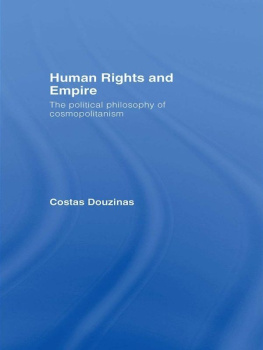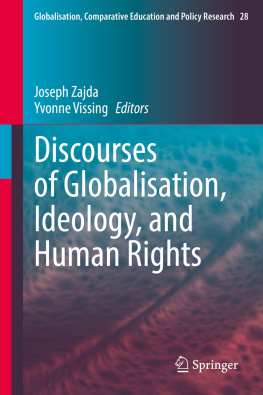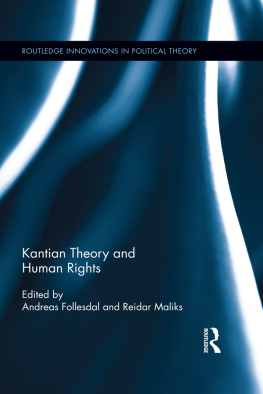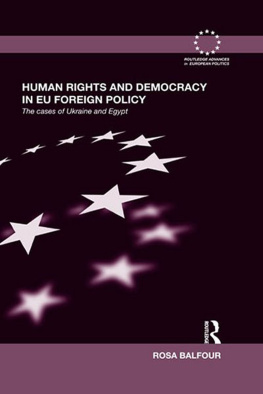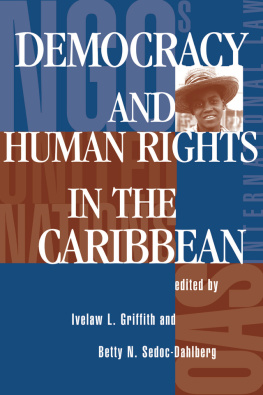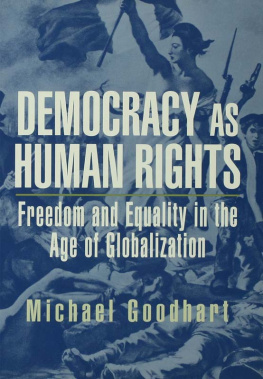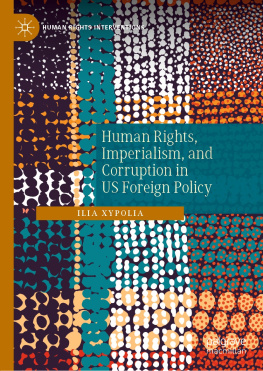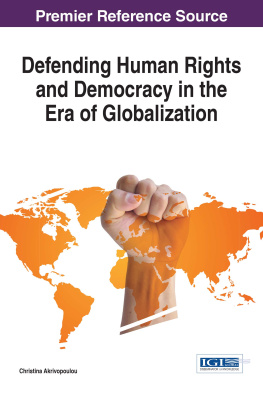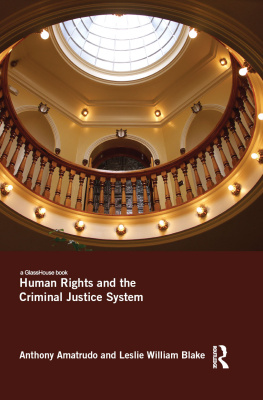HUMAN RIGHTS AND DEMOCRACY
To my Mother with Love
Human Rights and Democracy
Discourse Theory and Global Rights Institutions
EVA ERMAN
First published 2005 by Ashgate Publishing
Published 2016 by Routledge
2 Park Square, Milton Park, Abingdon, Oxon OX14 4RN
711 Third Avenue, New York, NY 10017, USA
Routledge is an imprint of the Taylor & Francis Group, an informa business
Copyright Eva Erman 2005
All rights reserved. No part of this book may be reprinted or reproduced or utilised in any form or by any electronic, mechanical, or other means, now known or hereafter invented, including photocopying and recording, or in any information storage or retrieval system, without permission in writing from the publishers.
Notice:
Product or corporate names may be trademarks or registered trademarks, and are used only for identification and explanation without intent to infringe.
Eva Erman has asserted her right under the Copyright, Designs and Patents Act, 1988, to be identified as the author of this work.
British Library Cataloguing in Publication Data
Erman, Eva
Human rights and democracy : discourse theory and global rights institutions
1. Human rights - Philosophy 2. Democracy
I. Title
323'.01
Library of Congress Cataloging-in-Publication Data
Erman, Eva.
Human rights and democracy: discourse theory and global rights institutions / by Eva Erman.
p. cm
Revision of the authors thesis (doctoral) originally presented under the title: Action and institution.
Includes bibliographical references and index.
ISBN 0-7546-4486-3
1. Human rights. 2. Democracy. 3. Discourse analysis. I. Erman, Eva. Action and institution. II. Title.
JC571.E742 2005
323'.01'4--dc22
2005004125
ISBN 9780754644866 (hbk)
Contents
I would like to express my gratitude to all those who have given me advice, support and encouragement during the accomplishment of this book. Although I am indebted to all my friends and colleagues at the Department of Political Science, Stockholm University, where criticism is encouraged and there is always room for intellectual creativity, I wish to thank the political theory group for useful comments during seminars. In particular, Bo Lindensj, Jouni Reinikainen, Ulf Mrkenstam, Andreas Gottardis and Sofia Nsstrm for their constructive criticism and suggestions. Valuable comments by Rune Premfors should also be mentioned.
Among those who have received me as a visiting scholar during this research period I wish to thank Paul Martin at the Center for the Study of Human Rights, Columbia University, for inviting me to the Center and making me feel at home in New York. For invaluable intellectual encouragement and advice my thanks go to Thomas Pogge who was my tutor during this visit. The regular philosophical evening gatherings at his place, on Riverside Drive, are unforgettable. The visit to Columbia University would not have been possible without a scholarship from the Swedish Foundation for International Cooperation in Research and Higher Education (STINT).
Further I wish to thank Geoffrey Brennan for inviting me to the Social and Political Theory Programme, at Australian National University, Canberra, and John Dryzek for his excellent tutoring of parts of my work. The daily jogging tour around the artificially created Lake Burley Griffin where the dripping sweat was anything but artificial was the only opportunity for me to even hope to win an argument. The philosophy reading group must also be mentioned as well as the recurring discussions with Philip Pettit. My visit to Australia was partly funded by scholarships from Theodor Adelswrds Minne and the Wallenberg Jubilee Fund.
Thanks are also due to the Wenner-Gren Foundations, who have made it possible for me to return to my old academic habitat at Columbia University as a postdoc scholar and give the finishing touches to this work.
Last but not least, I wish to thank two people: Niklas for his love and criticism, and our never-ending nightly discussions on every conceivable topic, and my mother Britt, not only for her language expertise but for giving me unwavering support and strength in moments of doubt.
When political scientists come up with new proposals for how to understand the international political order they are often met with scepticism. Not long ago, the cosmopolitan democratic theories that are taught today at most political science departments were, if not laughed at, at least looked upon with suspicion. It seems as if present political institutions, whatever present, are always insufficient to tackle the political problems they were created to solve. And there is much to indicate that todays present is not an exception. Although todays national and global political institutions are questioned in diverging ways, there seems to be general agreement that they are insufficient.1 Some claim that they should be strengthened, others argue that they must be complemented or replaced with other political forms, associations and processes.
In an era in which questions about how to design political institutions are often limited to technical and administrative aspects, it becomes more important than ever before to return to some of the basic ideas of Ancient Greece, which are indeed relevant even today: the public space and the political dialogue between speaking and listening subjects. The present work developed from both a philosophical interest in these ideas and from an empirical interest in how they could be realized and implemented by institutional means. But more importantly, it developed from a more profound interest in language and communication and how the public space and the political dialogue could be related not only to democracy as is commonly done, but also to human rights.
This book adopts a discourse theoretical view of human rights. Starting out from the notion of communicative action and the idea that human rights and democracy are mutually constitutive two central themes of discourse theory it offers an alternative approach to human rights than supplied by present cosmopolitan democratic theories. It is not an alternative in the sense that it is incompatible with all cosmopolitan projects (although with some), but rather in that it focuses on other aspects of the international political order, thereby drawing slightly different conclusions on how to legitimize and implement human rights by democratic means.
Within political scientific research three democratic dimensions are elaborated on in relation to the international system: democratization within states, between states and of the international system.2 While cosmopolitan democratic theories tend to focus on the relationship between the first two dimensions and how they affect the third dimension, this project primarily puts the third dimension in the limelight. A current problem of cosmopolitan theories seems to be that the international order has not been influenced by the triumphs of democracy around the world.3 Despite the fact that several nation-states have been democratized inwards, the international political system is still permeated by strategic action in line with nation-state interests. This is why the presumption by Daniele Archibugi et al that we must start from the first democratic dimension in order to promote the two latter ones is easily contested.4 We learn daily about democratic states not being very interested in democratization between states or democratization of the international system. Furthermore, concerning the role of alternative non-state actors, Archibugi


